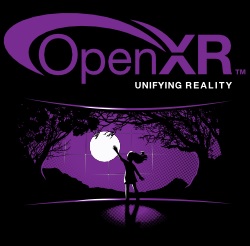 In Augmented Reality, Mixed Reality and Virtual Reality News
In Augmented Reality, Mixed Reality and Virtual Reality News
July 29, 2019 – The Khronos Group, an open consortium of hardware and software companies aiming to create advanced acceleration standards, has today announced the ratification and public release of the OpenXR 1.0 specification, together with publicly available implementations and “substantial ecosystem momentum”, according to the Group. OpenXR is a unifying, royalty-free, open standard that provides cross-platform access to virtual reality (VR) and augmented reality (AR) – collectively known as XR – platforms and devices. The new specification can be found on the Khronos website and via GitHub.
“The working group is excited to launch the 1.0 version of the OpenXR specification, and the feedback from the community on the provisional specification released in March has been invaluable to getting us to this significant milestone,” said Brent Insko, OpenXR working group chair and lead XR architect at Intel. “Our work continues as we now finalize a comprehensive test suite, integrate key game engine support, and plan the next set of features to evolve a truly vibrant, cross-platform standard for XR platforms and devices. Now is the time for software developers to start putting OpenXR to work.”
After gathering feedback from the XR community during the public review of the provisional specification, improvements were made to the OpenXR input subsystem, game engine editor support, and loader. The Khronos Group stated that with this 1.0 release, the working group will evolve the standard while maintaining full backwards compatibility from this point onward, giving software developers and hardware vendors a foundation upon which to deliver XR experiences.
OpenXR implementations from members are shipping this week, including the ‘Monado’ OpenXR open source implementation from Collabora, the OpenXR runtime for Windows Mixed Reality headsets from Microsoft, an Oculus OpenXR implementation for Rift, as well as Oculus Quest support coming upon ratification of OpenXR 1.0. Epic Games also plans to release OpenXR 1.0 support in Unreal Engine.
At SIGGRAPH 2019, OpenXR members Epic Games, Microsoft and Varjo will demonstrate XR applications targeting VR and AR platforms, all while using the same OpenXR API, in order to demonstrate how the standard reduces industry fragmentation through application portability.
Industry support for OpenXR 1.0:
“We’re thrilled to support the OpenXR 1.0 release, along with all of the Khronos Group members who have worked tirelessly to create the standard. Unreal Engine led the way with support for the OpenXR 0.9 provisional specification, and we’re excited to move the 1.0 revision forward in collaboration with our hardware partners releasing at the same time. Epic believes that open standards are essential to driving technology and bridging the gaps between digital ecosystems,” said Jules Blok, Epic Games.
“Facebook and Oculus continue to believe in the value the OpenXR standard delivers to users and developers. We plan to provide runtime support for apps built on OpenXR 1.0 on the Rift and Quest platforms,” said Nate Mitchell, Oculus Co-founder and head of VR product, Facebook.
“The mobile era of computing was defined and ultimately constrained by closed ecosystems. With mixed reality, the next wave of computing must be and will be open,” said Don Box, Technical Fellow at Microsoft. “Today, Microsoft is proud to release the first OpenXR 1.0 runtime that supports mixed reality, for all Windows Mixed Reality and HoloLens 2 users. We are excited to now work with the OpenXR community to design the key extensions that will bring mixed reality to life, with full support by end of year for HoloLens 2 hand tracking, eye tracking, spatial mapping and spatial anchors.”
“Unity is committed to being an open and accessible platform and we remain supportive of open standards for XR applications and devices,” said Ralph Hauwert, vice president of platforms at Unity Technologies. “To that end, we’re excited about OpenXR and believe this is a significant step towards a more open ecosystem.”
“We’re excited for the release of the OpenXR 1.0 specification because it ensures the enterprise community has compatible, easy access to the best XR technology on the market today while removing barriers to future innovation,” said Rémi Arnaud, principal architect at Varjo.
Image credit: The Khronos Group
About the author
Sam is the Founder and Managing Editor of Auganix. With a background in research and report writing, he has been covering XR industry news for the past seven years.
